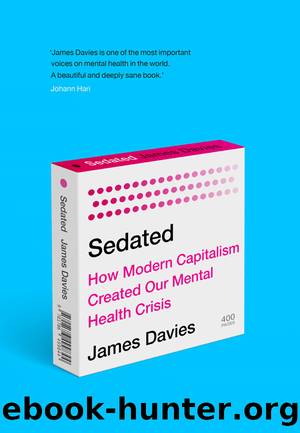Sedated by Davies James;

Author:Davies, James;
Language: eng
Format: epub
Publisher: Atlantic Books
Over fifteen years has passed since the Health Select Committeeâs inquiry, yet there has still not been any independent review into the MHRA,23 with the agency still operating in much the same way as identified in the Health Select Committeeâs report. Given the absence of any change, the question arises as to why the Select Committeeâs inquiry had no effect, or, as one committee member put it, âhas largely come to nothingâ. There are at least four reasons.
The first is obvious: David Hinchliffe resigned from Parliament in 2005 over the Iraq war and so was no longer able to hold the government to account as chair of the Health Select Committee. As I was told by the Conservative politician Sir David Amess, who remained on the committee long after Hinchliffeâs departure: âAfter the election, the committee was overtaken by many new members, who had no involvement in the inquiry and no real interest in the issue ⦠Had Hinchliffe remained, he would have made things happen â but that just wasnât to be.â
A further possible reason the report wasnât acted upon may have been because the person who replaced Hinchliffe as committee chair â Labour MP Kevin Barron â was himself close to the pharmaceutical industry. It transpired that Barronâs partner (later his wife) had been a lobbyist for the pharmaceutical industry during his tenure as chair of the committee, a domestic conflict of interest that may have amounted to very little. However, Barron, as chair of the Standards Committee, later broke the House of Commons code of conduct by agreeing to arrange events in Parliament for a group of pharmaceutical companies in exchange for many thousands of pounds. All this of course did not bode well for the implementation of Hinchliffeâs report, which was, after all, highly critical of corrosive pharmaceutical financial ties and conflicts of interest.24
While such problems certainly damaged the impact of Hinchliffeâs inquiry, these reasons were perhaps inconsequential compared to the next on our list, one to which the health minister at the time, Jayne Kennedy MP, alluded when issuing the governmentâs response to the inquiry. While acknowledging that it exposed some problems, she concluded that the inquiry must nevertheless be âmindfulâ not to impose âregulatory burdensâ on the pharmaceutical sector.25 In other words, by asking for more balanced drug regulation, the report went against the dominant deregulatory ideology of the day.
I asked Hinchliffeâs colleague on the Health Select Committee, David Amess, whether this could explain the aversion to reforming the MHRA, he was unequivocal: âThatâs absolutely the reason; this was the height of New Labour â people said they werenât privatising things when they were. Youâll remember how they exempted Formula One from certain advertising regulations; and how they deregulated the banks under Gordon Brown â we could go on ⦠It was all about advocating light-touch regulation.â26
Hinchliffe echoed Amessâs view: âTo have done anything about the regulatory agency would have impacted on the commercial interests of the pharmaceutical industry, which deregulation served. This was the overall thinking in government.
Download
This site does not store any files on its server. We only index and link to content provided by other sites. Please contact the content providers to delete copyright contents if any and email us, we'll remove relevant links or contents immediately.
The Art of Coaching by Elena Aguilar(52088)
Thinking, Fast and Slow by Kahneman Daniel(11692)
The Art of Thinking Clearly by Rolf Dobelli(9816)
The 5 Love Languages: The Secret to Love That Lasts by Gary Chapman(9177)
Mindhunter: Inside the FBI's Elite Serial Crime Unit by John E. Douglas & Mark Olshaker(8656)
When Breath Becomes Air by Paul Kalanithi(7984)
Periodization Training for Sports by Tudor Bompa(7892)
Becoming Supernatural by Dr. Joe Dispenza(7799)
Turbulence by E. J. Noyes(7665)
Bodyweight Strength Training by Jay Cardiello(7602)
Therapeutic Modalities for Musculoskeletal Injuries, 4E by Craig R. Denegar & Ethan Saliba & Susan Saliba(7582)
The Road Less Traveled by M. Scott Peck(7237)
Nudge - Improving Decisions about Health, Wealth, and Happiness by Thaler Sunstein(7199)
Mastermind: How to Think Like Sherlock Holmes by Maria Konnikova(6898)
Enlightenment Now: The Case for Reason, Science, Humanism, and Progress by Steven Pinker(6849)
Win Bigly by Scott Adams(6792)
Kaplan MCAT General Chemistry Review by Kaplan(6550)
Why We Sleep: Unlocking the Power of Sleep and Dreams by Matthew Walker(6307)
The Way of Zen by Alan W. Watts(6258)
